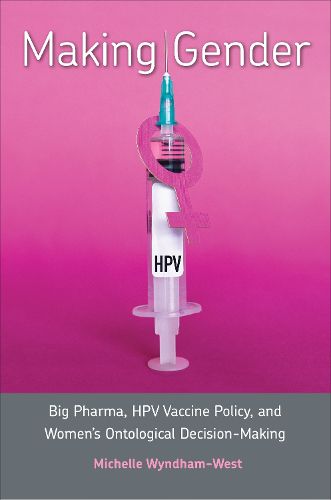Readings Newsletter
Become a Readings Member to make your shopping experience even easier.
Sign in or sign up for free!
You’re not far away from qualifying for FREE standard shipping within Australia
You’ve qualified for FREE standard shipping within Australia
The cart is loading…






This book aims to understand how gender and risk have been incorporated into women's decision-making around the HPV vaccine.
Making Gender endeavours to understand how the HPV vaccine became gendered within the Canadian policy landscape - when the virus is gender blind and is linked to cancer in all genders - and how women's experiences with this 'gendered risk' have been folded into their vaccine decision-making.
Drawing on ethnographic fieldwork and archival research, Michelle Wyndham-West explores the creation and circulation of gendered risk as it was deployed in pharmaceutical and policy discourses surrounding the rollout of the HPV vaccine. The book contextualises the background for how gendered risk was mediated by two groups of women: mothers negotiating the vaccine for their daughters in school-based immunisation programs and university students who experienced frequent HPV infections. The book explores these women's efforts to be good mothers and strong young women entering adulthood who felt vulnerable in sexual health negotiation. As a result, Making Gender reveals how vaccine decision-making took an ontological form, as an inherently social and cultural process embedded in women's experiences.
$9.00 standard shipping within Australia
FREE standard shipping within Australia for orders over $100.00
Express & International shipping calculated at checkout
This book aims to understand how gender and risk have been incorporated into women's decision-making around the HPV vaccine.
Making Gender endeavours to understand how the HPV vaccine became gendered within the Canadian policy landscape - when the virus is gender blind and is linked to cancer in all genders - and how women's experiences with this 'gendered risk' have been folded into their vaccine decision-making.
Drawing on ethnographic fieldwork and archival research, Michelle Wyndham-West explores the creation and circulation of gendered risk as it was deployed in pharmaceutical and policy discourses surrounding the rollout of the HPV vaccine. The book contextualises the background for how gendered risk was mediated by two groups of women: mothers negotiating the vaccine for their daughters in school-based immunisation programs and university students who experienced frequent HPV infections. The book explores these women's efforts to be good mothers and strong young women entering adulthood who felt vulnerable in sexual health negotiation. As a result, Making Gender reveals how vaccine decision-making took an ontological form, as an inherently social and cultural process embedded in women's experiences.